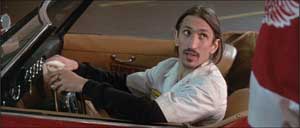
|
|
|
Friday 27 May 2005
Cultural Note
Hazards Of Creeping Professionalism Professional is generally a compliment. Companies selling DIY stuff promise ‘professional results’. Cameras with more dials and knobs are sold as professional gear. People who buy these cameras hope that their friends will look at the resulting photographs and say, ‘Hrm, looks professional!’ Conversely, being seen as unprofessional is a very bad thing: unprofessional behavior at work is usually grounds for dismissal. An ‘unprofessional job’ is a sloppy one, maybe with glue oozing out the joints. I would argue that this veneration of ‘professionalism’ is a bad thing, and that it needs to stop. Professional serves as a useful term to distinguish things done for pay that are often done by amateurs (such as ‘professional baseball’ or ‘professional photography), but its use as a marker of quality or competence must end. There are costs, as well as benefits, to ‘professionalism’, and while these costs are worth the benefits in the traditional professions, they are emphatically not worth it in most, if not all, of the situations in which the term professional is now being fraudulently used. Traditionally, very few lines of work have been considered ‘professions’. The state of New York’s Office of the Professions recognizes and licenses forty-seven professions. If we lump things like podiatry and physical therapy together with medicine, and interior design and architecture with engineering, we come up with very few:
There are a few other fields, like banking and law and so forth which are also clearly professional work, but which are regulated by different organizations and thus not on New York’s list. In any case, we wind up with very few actual professions. Why are these things professions while other things are jobs? The dictionary suggests that the difference is that a profession involves prolonged training and formal qualifications, but that’s not very accurate. There are plenty of fields of work that require long training and formal qualifications but that are not widely considered ‘professions’; and some traditional professions don’t require all that much training, and require formal qualifications only because they are market-limiting ruses of the field’s trade association (massage therapists, for instance, are considered ‘professionals’ in New York). A better definition is that a profession is a job that has an important ethical component to it. It’s not like non-professionals are encouraged to lie and slack off at their work: but lawyers, physicians, accountants, etc. all have their own codes of ethics and conduct, to which they are supposed to adhere on their own. An even better definition involves the reasoning behind lawyers’ etc. professional codes: all true professions, it seems to me, are jobs where the customer is explicitly not always right. True professionals are not infrequently in the position of having to tell their clients what they don’t want to hear. A physician who didn’t tell his obese patient to eat less and exercise more would not be doing his job. A lawyer who didn’t warn his client away from a lucrative but illegal deal wouldn’t be doing his job. A surveyor who didn’t tell his client that, no, his driveway really was on his neighbor’s property wouldn’t be doing his job. And so on. The professional ethical codes exist partly to keep the professionals themselves in line, but their main purpose is (hopefully) to keep the professionals’ clientele from shopping around until they find an accountant, say, who’s willing to sign bogus balance sheets, or an engineer willing to construct a building that’s going to fall down. There have always been crooked lawyers, and as recent scandals have shown, it’s certainly possible, if there’s enough money involved, to bend the ethics of even the most prestigious accounting firms. Still, the system works remarkably well. When dealing with a real professional, part of the client’s responsibility is to listen to the professional’s advice: to ‘leave it to the professional’, so to speak. The problem comes when we start thinking of everything as a ‘profession’. Claiming to be a professional is a polite way of telling your client to shut up.
In Ferris Bueller’s Day Off, the dodgy parking-garage attendant reassures the reluctant Cameron by saying, ‘You fellas have nothing to worry about. I’m a professional’, immediately before taking Cameron’s father’s Ferrari back out of the garage for a joyride. Cameron is dubious (in an aside, he asks ‘Professional what?’), but the authority of the professional is such that gives in anyway. (See video of the scene here (requires Quicktime 7; 1:20, 8.7 mb) or here (Quicktime 6; 1:20, 10.2 mb).) This is absurd, of course, which is why you find it in the middle of a comedy. But there are a lot of situations in real life where the same fraudulent professionalism is used to shift power to the vendor in the customer-vendor relationship, and most (if not all of these) shifts cause, or have the capacity to cause, serious problems as they short-circuit the mechanism by which performance feedback is given. Police, flight attendants, waiters, teachers, politicians, maids, and seemingly everyone else today hold themselves out as ‘professionals’. Part of this is undoubtedly due to the fact that traditional professional work is typically well-compensated; the cargo-cult mentality says that if I, too, become a professional floor mopper, I’ll soon be driving a Mercedes and playing tennis. More easily attained, though, is the goal of evading immediate responsibility for, and criticism of, one’s acts. I’ve been thinking about this lately and will be referring to this creeping ‘professionalism’ in the future, so I thought it best to lay out the basic idea here. Posted by tino at 14:56 27.05.05This entry's TrackBack URL::
http://tinotopia.com/cgi-bin/mt3/tinotopia-tb.pl/429 Links to weblogs that reference 'Hazards Of Creeping Professionalism' from Tinotopia. |
